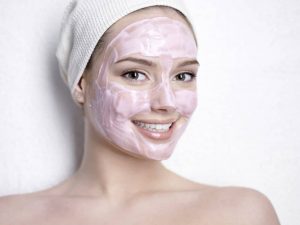
Kefir is a common drink in Russia, Belarus, Kazakhstan, Kyrgyzstan, the Baltic countries, Ukraine, Germany, Uzbekistan, Sweden, Norway, Hungary, Poland, Israel, the USA and Australia. Basically, the countries where dairy products are common and daily abundant. It is a sour-milk drink obtained from whole or skimmed cow’s milk that is fermented using kefir grain – a symbiosis of several types of microorganisms: lactic streptococci, acetic acid bacteria and yeast. It is thinner than yogurt, sourer, and slightly bitter. This drink has been drunk for so long for its excellent benefits for health. But did you know that it can be applied as a natural skin care too?
Kefir and its composition
The secret of kefir lies in its composition. Kefir differs from other fermented milk products with a unique set of bacteria and fungi that make up its composition. It is divided into one-day, two-day and three-day fermentation. The classification reflects certain qualities of kefir: its acidity, the degree of accumulation of carbon dioxide and alcohol, as well as the degree of swelling of proteins.
The ethanol content reaches 0.07% in one-day and up to 0.88% in three-day. But, if kefir stood open for a long time and peroxide, the level of ethanol can reach 2.5-3%. Kefir sold in the territory of the Russian Federation should contain at least 3.0 g of protein per 100 grams and have acidity in the region of 85-130°T. Fat content (as a percentage of mass) can vary over a wide range from less than 0.5% for fat-free to at least 7.2-8.9% for high fat; classic kefir has 2.5% fat. Store ready-made kefir is recommended at a temperature of 2-4°C.
The benefits of kefir
Kefir, like other fermented milk products, has a probiotic effect that could favorably affect the intestinal microflora and metabolism as a whole. Due to its complex composition, kefir can inhibit the development of pathogenic flora in the intestine. Its medicinal properties are based on the bactericidal activity of lactic acid microorganisms and the results of their activity in relation to the causative agents of certain gastrointestinal diseases and tuberculosis. In addition, kefir has an immunostimulating, calming and mild diuretic effect.
Some varieties of kefir are superior to yogurt in the content of vitamins A, D, K and E. A few grams of alcohol, obtained through kefir per day, can become a source of a small amount of alcohol for the Mediterranean diet. It has been shown that for people suffering from lactose intolerance, the use of kefir can contribute to the normal absorption of this carbohydrate.
In addition to ordinary kefir, there are other varieties of it: biokefir and bifikefir. They differ mainly in the microflora content, which has a different effect on the microbiocenosis of the gastrointestinal tract. The most useful is considered biokefir, which includes bifidobacteria, as stated on the package. It improves the function of the gastrointestinal tract, tones the nervous and cardiovascular systems, reduces the risk of cancer, and also neutralizes the side effects of antibiotics.
If you need to cut some weight, try to arrange a weekly kefir diet for yourself. Its main advantage is the products included in it that will keep you from craving for food. The fat content of kefir should be one or one and a half percent and all dishes should be eaten without salt and sugar. In order to lose weight and improve the overall health of the body, kefir diet is recommended to be repeated approximately every two months.
Kefir for your skin care
Kefir is healthy, nutritious and very tasty. It is full of useful vitamins and minerals, as well as probiotics vital for intestinal health. With kefir, you can cook smoothies, soups, pastries, as well as healthy salad sauces. In addition, kefir can be used to care for face, skin and hair.
Here are the benefits of using kefir masks for skin and face:
- Kefir helps cleanse the skin while keeping it fresh and radiant.
- Kefir has whitening properties, which will be useful for freckles and age spots.
- Kefir contains amino acids that perfectly nourish and moisturize the skin.
- Thanks to the good bacteria in kefir, the masks help to regulate the acid-base balance of the skin.
- Kefir masks, due to the content of amino acids, will help prolong the youth of the skin and make it healthier.
The simplest mask based on kefir: Take a cotton pad, dip in kefir and apply to cleansed skin. Leave the kefir on the skin for 10-15 minutes, then rinse with warm water.
Kefir mask for normal / combination skin
- 2 tablespoons kefir
- 1 small cucumber
Grind the cucumber and squeeze the juice. Mix cucumber juice with kefir. On the cleansed skin, apply a mask and leave it on for 20 minutes, then rinse with warm water. The skin will become softer and more beautiful!
Kefir mask for oily skin
- 2 tablespoons kefir
- 1 egg white
- 1 tablespoon of honey
Pour all the ingredients into a bowl and mix well. Apply the mask to cleansed face for 15-20 minutes, then rinse with water. Honey has anti-inflammatory and antibacterial properties that will help improve the condition of your skin, and egg white will narrow the pores.
Kefir mask for dry skin
- 2 tablespoons kefir
- 1 egg yolk
- 1 teaspoon olive oil
Pour all the ingredients into a bowl and mix well. Apply the mask to cleansed face for 15-20 minutes, then rinse with water and pat it with a soft towel. Thanks to olive oil and egg yolk, this mask will help dry skin to restore its natural freshness.
Other than masks, kefir can also be used as scrub by mixing it with oatmeal or ground almonds. All of the ingredients are easy to get so you can right away try and whip up your own Russian kefir skin care at home.
